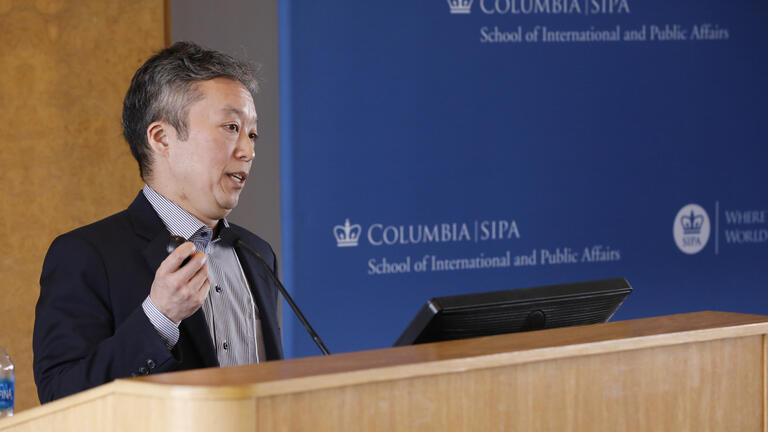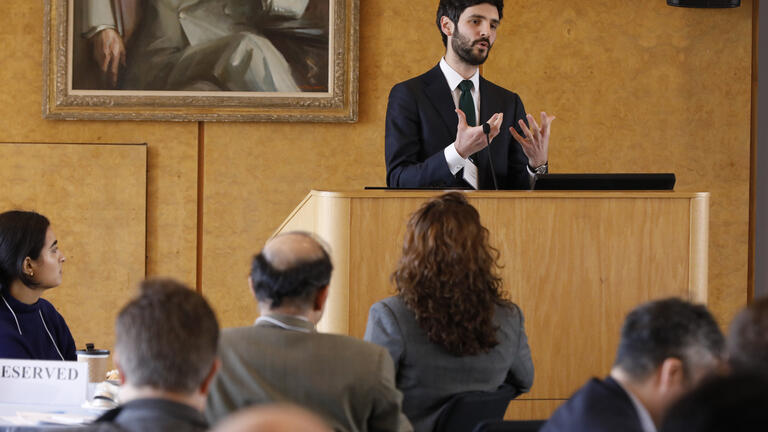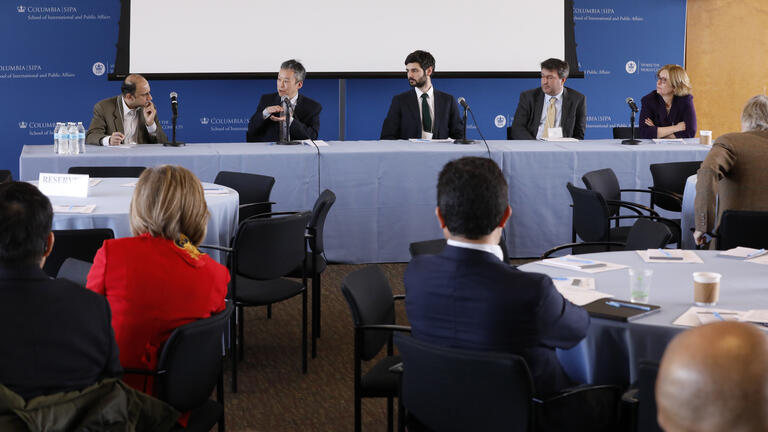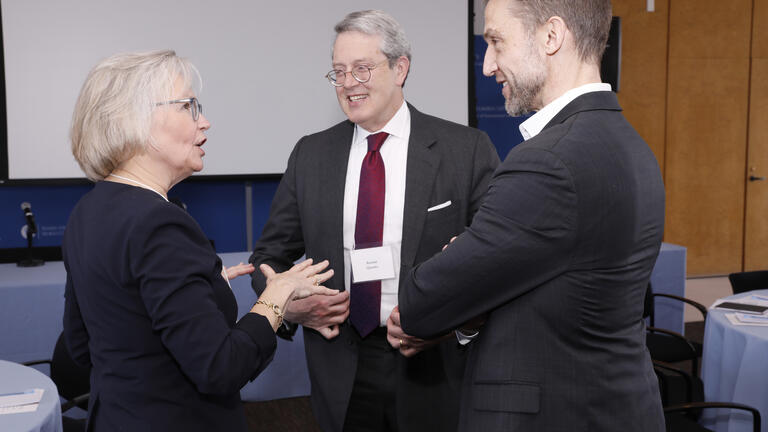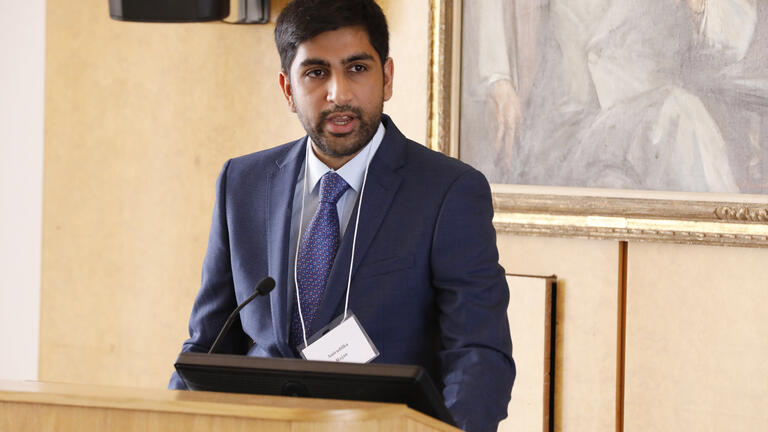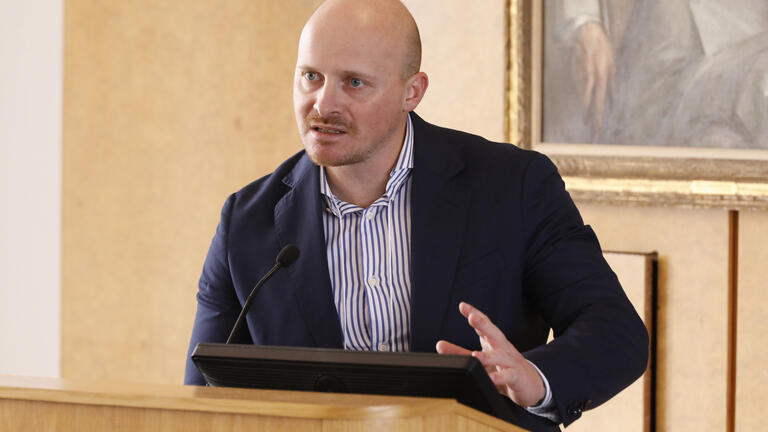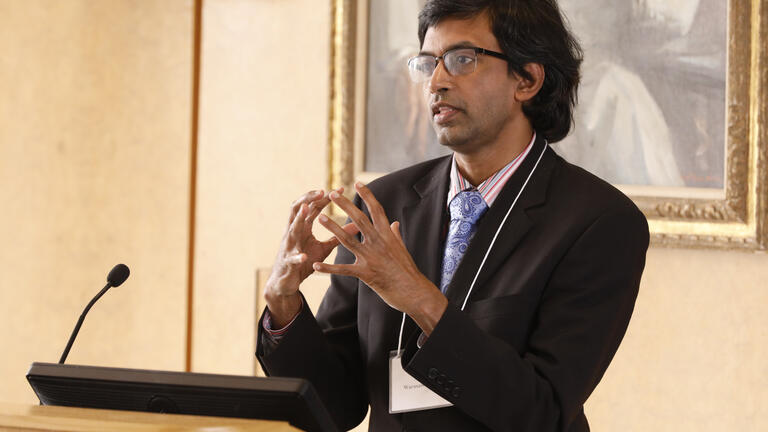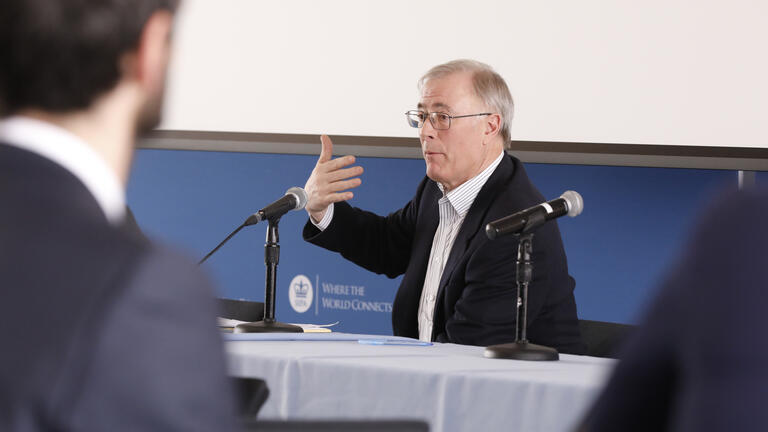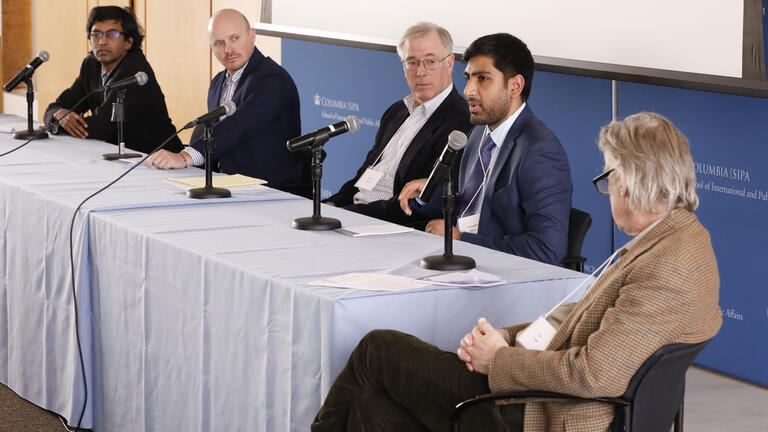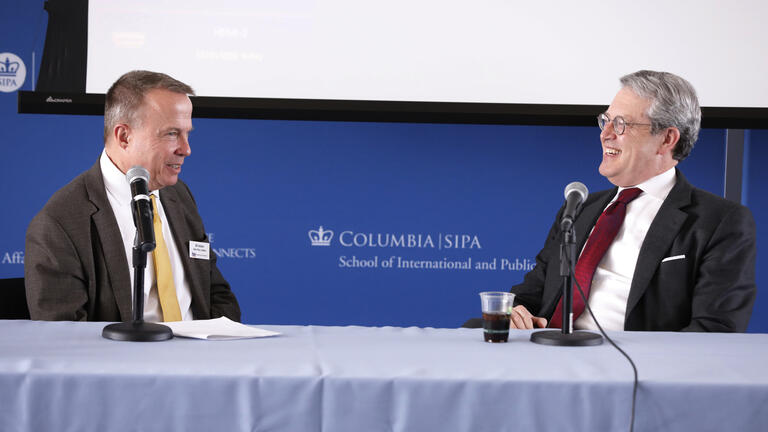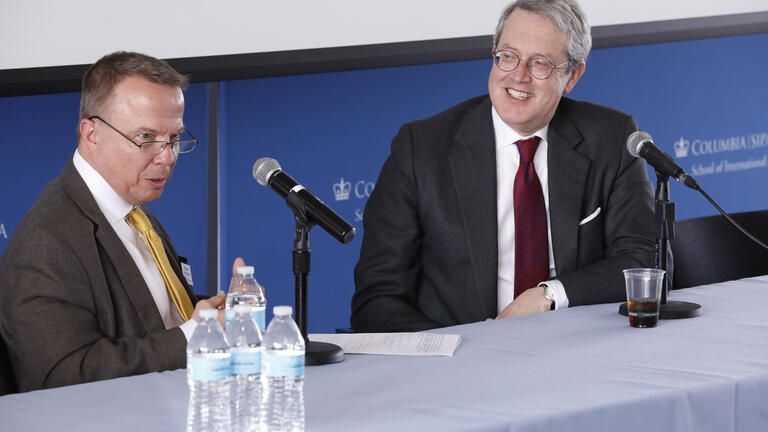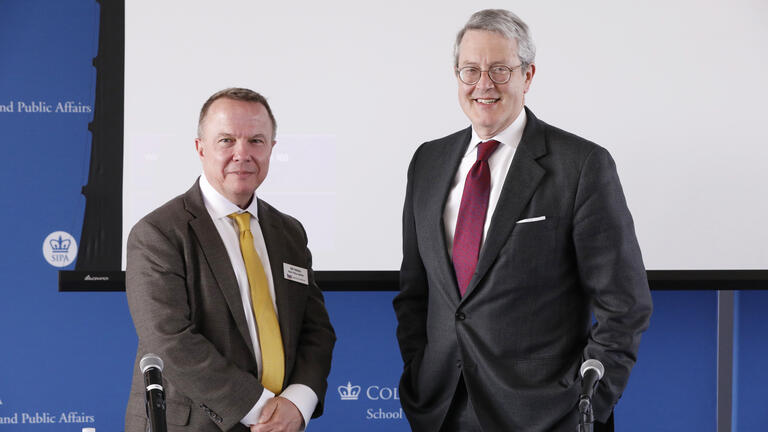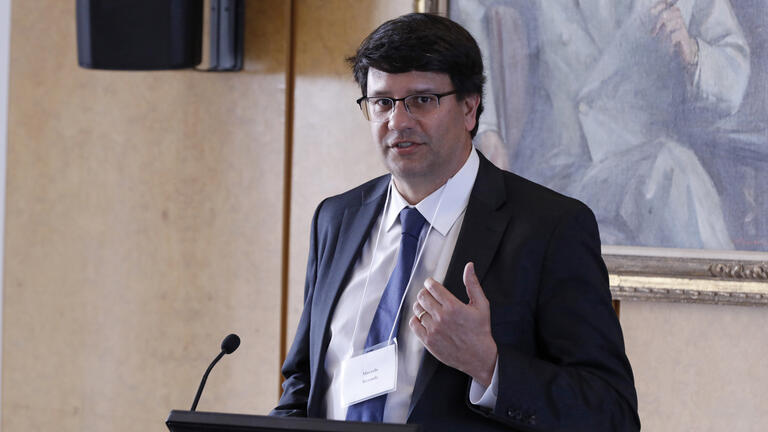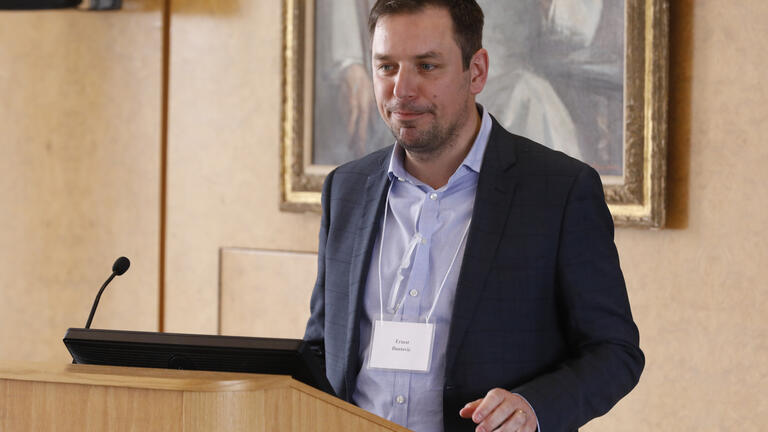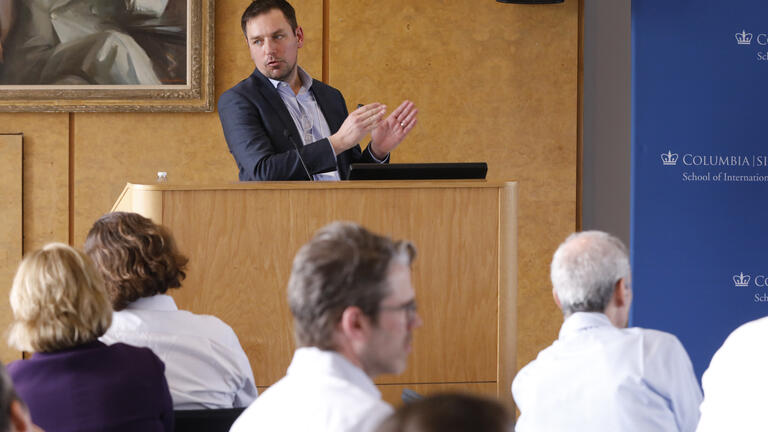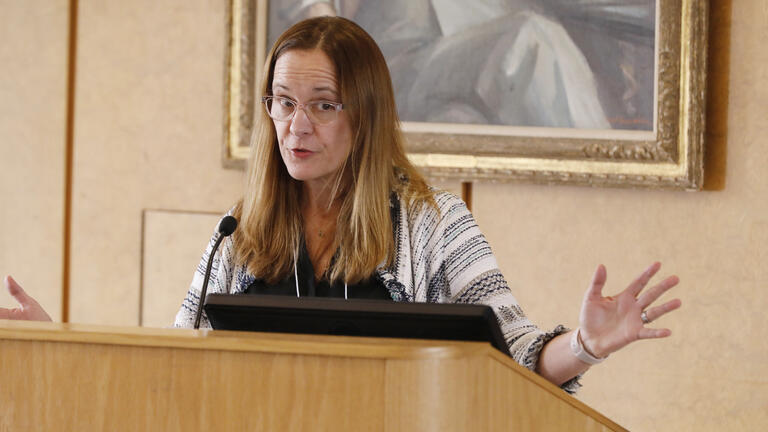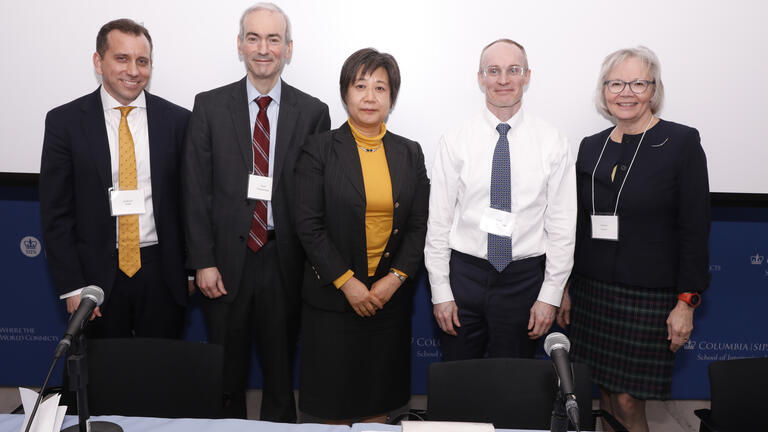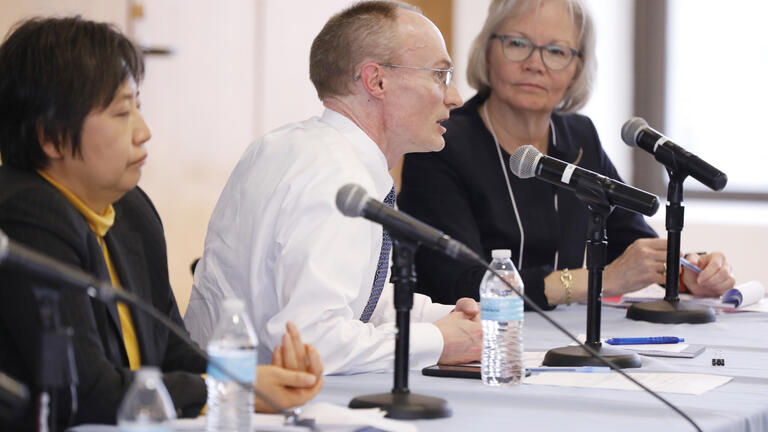7th Annual Columbia SIPA/BPI Bank Regulation Conference
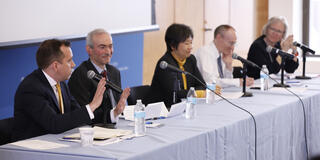
This conference brought together academics, market participants, and policymakers to discuss the latest research on the design and impacts of regulation. This year, in light of current recession risks, the conference was focused on procyclicality or countercyclicality of bank regulatory policy and supervision.
Event Date: March 1, 2023 | The International Affairs Building, Columbia University
Event Summary
The seventh annual Conference on Bank Regulation of the Bank Policy Institute & Columbia University School of International and Public Affairs took place on March 1, 2023. Each year, the conference brings together academics, banking agency economists, and market participants to discuss the latest research on banking and bank regulation. This year’s theme was bank regulation and the business cycle. The conference covered bank capital and lending dynamics through the cycle, evidence on countercyclical capital buffers and temporary regulatory actions, and expected next steps for capital and liquidity regulation. The conference was held under Chatham House rule.
The first session consisted of one empirical and one theoretical paper examining effects of market discipline and counter-cyclical buffer requirements on bank capital and lending dynamics.
The empirical paper in this session, presented by Cyril Couaillier from the European Central Bank, examines how firms choose and then attain their target capital ratio. The analysis is based on quarterly, target capital ratios manually collected from reports and investment presentations of 74 European banks, merged with bank-level financial and balance sheet information and macroeconomic data, covering the period from the first quarter of 2014 through fourth quarter of 2021. One key takeaway is that changes in the target move with change in regulatory capital requirements, which makes the internal target pro-cyclical. However, the co-movement is less than one-to-one, which a panel discussant suggested might reflect conservatism in the regulatory requirements. Another empirical finding is that banks adjust faster from the downside than the upside to the target.
The theory paper, presented by Yasuo Terajima from the Bank of Canada, develops a dynamic simulation model with a stochastic macroeconomic state (normal and crises), bank-specific loan failure rate shocks and an endogenous bank default that generates a risk premium on the bank’s wholesale funding that entails market discipline. Banks in the model also are subject to capital requirements that allow for a countercyclical buffer (CCyB). Simulations are conducted for banks differentiated by initial capital ratio. The results confirm the benefits of a CCyB over constant capital requirements: smoother credit supply and reduced bank failure probabilities. Effects of a CCyB and of market discipline vary by bank capital level; for instance, a CCyB is particularly beneficial for banks with lower capital ratios.
The second panel of the conference consisted of two empirical studies examining effects of capital relief during the COVID-19 pandemic.
The first paper, presented by Aniruddha Rajan from the Bank of England, examines the effects of easing of the CCyB on mortgage lending in the UK. The authors find that banks used the CCyB relief in part to increase their precautionary capital surpluses over the regulatory threshold, and that this effect was larger for low surplus banks. In addition, the study tests the benefits of releasability by exploiting the fact that the cut to the CCyB in the UK at the onset of the crisis varied across banks based their relative exposure to UK credit risk-weighted assets. Results indicate that banks for whom a greater proportion of their regulatory buffers would have been released did not materially increase capital surpluses over 2020 and were able to lend more and take on more credit risk.
The second paper, presented by Alessio Reghezza from the European Central Bank, examines the effects on bank lending of three different regulatory capital relief measures in Europe: change in the composition of capital instruments required (a permanent reduction in CET1), release of the CCyB, and the easing of prudential guidance. The empirical approach compared effects across different banks that are lending to the same borrower, using credit registry data. The analysis finds that the more concrete capital relief offered by the first two measures led to increased lending while changes in guidance had little effect. Effects were stronger for banks that were closer to the regulatory buffer threshold.
The keynote address by former Federal Reserve vice chairman Randall Quarles covered a range of timely topics in monetary policy and banking regulation.
The third panel focused on instances of temporary change to regulatory policy during the pandemic: the exemption of bank reserves and Treasury securities from the denominator of the Supplementary Leverage Ratio in the U.S., and suspension of dividend payouts in the EU.
The first paper of the panel, presented by Marcelo Rezende, Federal Reserve Board, examines the effects of the SLR and temporary SLR relief on banks’ participation in U.S. treasury markets. The paper first considers banks’ responses to the large, unexpected increase in credit line drawdowns that occurred at the start of the pandemic, which mechanically increased the denominator of the SLR ratio as some assets moved from off-balance sheet to on-balance sheet. The analysis finds that credit line drawdowns led to a large decline in treasury market participation by banks, but this effect is weaker for banks with large SLR buffers. These effects diminished after the Federal Reserve exempted reserves and Treasuries from the denominator of the SLR formula. The study suggests that banks’ ability to participate in markets for safe assets may be curtailed by leverage regulations.
The second paper, presented by Ernest Dautović, European Central Bank, examines the impact of the ECB’s dividend distribution recommendations on banks’ lending and loss absorption capacity during the pandemic, differentiating across banks based on their pre-pandemic dividend plans. Banks that reversed previously planned dividend distributions increased their lending and their loss provisions relative to banks that did not revise their plans. The results suggest that the recommendations were successful in helping to maintain the flow of credit and enhancing resilience to credit losses.
A final, policy panel focused on what is next for banking regulation. The panel discussion commenced with lessons learned from the Covid-19 crisis, including recognition of procyclical elements of the regulatory framework and ways to mitigate them. Panel participants were Tomoko Amaya from the Japanese Financial Services Agency, Mark Van Der Weide from the Federal Reserve Board, Paul Glasserman from Columbia University, and Andrew Nash from Morgan Stanley.
Columbia SIPA and BPI would like to thank each of the above presenters, keynote speaker, and panelists as well as the following moderators and discussants: Viral Acharya (New York University Stern), Adam Ashcraft (Bank of America), Paul Calem (Bank Policy Institute), Christine Cumming (Columbia University), D. Wilson Ervin (U.S. Treasury), Betsy Graseck (Morgan Stanley), Beverly Hirtle (Federal Reserve Bank of New York), Timothy Landvoigt (University of Pennsylvania Wharton), Patricia Mosser (Columbia University), Bill Nelson (Chief Economist, Bank Policy Institute), and Missaka Warusawitharna (Federal Reserve Board of Governors).
Papers
Paper Session 1: Capital Dynamics and Regulation
- Moderator: Beverly Hirtle (Federal Reserve Bank of New York)
- Yasuo Terajima (Bank of Canada) "Banking Dynamics, Market Discipline and Capital Regulations" [slides]
- Cyril Couaillier (European Central Bank) "What are banks' actual capital targets?" [slides]
- Discussants: Viral Acharya (New York University Stern) [slides]; Adam Ashcraft (Bank of America)
Paper Session 2: Countercyclical Capital Buffers
- Moderator: Paul Calem (Bank Policy Institute)
- Aniruddha Rajan (Bank of England) "Useful, usable, and used: Buffer usability during the Covid-19 crisis"
- Alessio Reghezza (European Central Bank) "How to Release Capital Requirements during a Pandemic? Evidence from Euro Area Banks" [slides]
- Discussants: Missaka Warusawitharana (Federal Reserve Board) [slides]; D. Wilson Ervin (U.S. Treasury)
Keynote: Randal K. Quarles (Cynosure Group, former Vice Chair for Supervision, Federal Reserve Board of Governors)
- With Bill Nelson (Bank Policy Institute)
Paper Session 3: Evidence on Temporary Regulatory Actions
- Moderator: Christine Cumming (Columbia University SIPA)
- Marcelo Rezende (Federal Reserve Board) "Leverage Regulations and Treasury Market Participation: Evidence from Credit Line Drawdowns" [slides]
- Ernest Dautovic (European Central Bank) "Supervisory Policy Stimulus: Evidence from the Euro Area Dividend Recommendation" [slides]
- Discussants: Tim Landvoigt (University of Pennsylvania Wharton) [slides]; Betsy Graseck (Morgan Stanley)
Panel Discussion: What is Next for Bank Regulation?
- Moderator: Patricia Mosser (Columbia University SIPA)
- Tomoko Amaya (Japanese Financial Services Agency)
- Mark Van Der Weide (Federal Reserve Board)
- Paul Glasserman (Columbia University School of Business) [slides]
- Andrew Nash (Morgan Stanley)
Sponsors: Columbia University School of International and Public Affairs and the Bank Policy Institute
Participant Biographies
-
Viral V. Acharya is the C.V. Starr Professor of Economics in the Department of Finance at New York University Stern School of Business (NYU-Stern). He was a Deputy Governor at the Reserve Bank of India (RBI) during January 2017 to 23rd July 2019 in charge of Monetary Policy, Financial Markets, Financial Stability, and Research. He is a Research Associate of the National Bureau of Economic Research (NBER) in Corporate Finance, a Research Affiliate at the Center for Economic Policy Research (CEPR), and Research Associate of the European Corporate Governance Institute (ECGI). He has been an Academic Advisor to the Federal Reserve Banks of Chicago, Cleveland, New York and Philadelphia, and the Board of Governors, and provided Academic Expert service to the Bank for International Settlements, The International Monetary Fund and the World Bank. He is a (conditional) member of the Climate-related Financial Risk Advisory Committee (CFRAC) of the Financial Stability Oversight Council. His primary research interest is in theoretical and empirical analysis of systemic risk of the financial sector, its regulation and its genesis in government- and policy-induced distortions, an inquiry that cuts across several other strands of research – credit risk and liquidity risk, their interactions and agency-theoretic foundations, as well as their general equilibrium consequences, as well as climate-change related risks.
-
Ms. Amaya is Vice Minister for International Affairs at Japan’s Financial Services Agency (JFSA) since July 2021. Prior to the current position, she served as Vice Commissioner for International Affairs (2019-2021). She is a member of the Financial Stability Board (FSB). Ms. Amaya joined the Ministry of Finance (MOF) in 1986 and has broad experience in financial supervision and international financial regulations over her career at FSA and MOF. Her career at FSA includes Deputy Secretary-General of Securities and Exchange Surveillance Commission (SESC) (2017-2019), Secretary General of Certified Public Accountants and Auditing Oversight Board (CPAAOB) (2015-2017). Director for Market and Risk (2008-2010) and Director for International Insurance Services (2002-2006). From 2013 to 2015, Ms. Amaya served as Senior Executive Director at Deposit Insurance Corporation. She was also Visiting Professor at Graduate School of Public Policy, the University of Tokyo in 2011-2013. Ms. Amaya earned B.A. in Law at the University of Tokyo. She also finished Mid-Career Associate Program, IR/PS at the University of California, San Diego.
-
Adam Ashcraft is a Managing Director in the Global Risk Management Group of Bank of America. In his current role, he is responsible for collaborating with stakeholders on the design and implementation of scenarios used for a wide range of risk management uses, including but not limited to internal stress testing, allowance, corporate planning, and climate scenario analysis. Prior to joining Bank of America in 2018, Adam spent 17 years at the Federal Reserve Bank of New York in various roles including Co-Chair of the LISCC Liquidity Program, the Head of Credit Risk Management, and as a Research Economist. He has a PhD in Economics from MIT, and published and refereed papers in academic journals on securitization, monetary policy, and risk management.
-
Paul Calem is a senior vice president for research at the Bank Policy Institute. He joins BPI from the Federal Reserve Bank of Philadelphia where he was a Vice President in the Supervision, Regulation and Credit Department. Dr. Calem concentrates on household finance. While at the Philadelphia Fed, he managed a unit that provided policy analysis and research on retail credit risk issues, along with the provision of quantitative support for bank examinations. Moreover, the unit developed the original, CCAR/DFAST stress test models for core retail portfolios. He has also served as a senior economist at the Federal Reserve Board, a Director at Freddie Mac, and Vice President for Product Research at the mortgage data and analytics company Loan Performance. Dr. Calem has published extensively in peer-reviewed economic journals on household finance. He holds a Ph.D. and a master’s degree in economics from Brown University and bachelor’s in mathematics from Duke University.
-
Cyril Couaillier is an economist at the European Central Bank since 2020, currently in the Monetary Policy directorate. He previously worked five years at the Banque de France on financial stability. His research interests lie in financial stability, financial regulation and monetary policy. He particularly focuses on the design and impact of macroprudential policies, the role of bank capital for financial stability and monetary policy and the role of non-bank financial institutions for the conduct of monetary policy. He graduated from HEC Paris, ENSAE and the Paris School of Economics and holds a PhD from SciencesPo Paris.
-
Christine Cumming has been an Adjunct Professor at Columbia University’s School of International and Public Affairs since 2016, teaching courses in financial regulation and financial stability. She retired in 2015 from the Federal Reserve Bank of New York as First Vice President and Chief Operating Officer, having previously had senior leadership roles in Research and Statistics and in Bank Supervision. Over her career, she has focused on risk management, capital markets, financial institution solvency and liquidity, and handling distressed financial institutions, and while at the Fed, participated in working groups of the Basel Committee on Banking Supervision and the Financial Stability Forum. Ms. Cumming has a Ph.D. and a B.S. in Economics from the University of Minnesota.
-
Ernest has been at the European Central Bank (ECB) since 2016, where he is working in DG-Economics with previous experience in banking supervision, financial stability, and research departments. Before joining the ECB, he was a consultant at the World Bank Group on projects related to trade facilitation and private sector development. His research interests encompass a broad set of topics spanning impact evaluations of government and central bank policies in finance, macroeconomics, labor and trade. Ernest obtained his Ph.D. in Political Economy at the University of Lausanne, Switzerland. M.Sc. from University of Rome ‘La Sapienza’, and from the University of Amsterdam; B.Sc. from University of Bologna.
-
Wilson Ervin is a senior Counsellor in the Domestic Finance department the US Treasury, focusing on climate-related issues. Prior to this, Wilson had spent many decades on Wall Street, mostly in markets and risk management roles. He was the Chief Risk Officer of Credit Suisse for many years, retiring from that role in 2009 once that firm had successfully navigated the 2008 Financial Crisis without government support. After that, he spent a decade working on policy reforms, and including a pioneering paper outlining a new “bail-in” concept in the Economist, designed to address the “too-big-to-fail” problem. This technique has now been implemented across the major financial centers. He has been a long-time member of EDF’s National Council, and most has recently been working pro bono as a Senior Advisor for Emergent, a non-profit focused on reducing tropical deforestation at a jurisdictional scale.
-
Paul Glasserman is the Jack R. Anderson Professor of Business at Columbia Business School, and he chairs the Financial and Business Analytics Center within Columbia University's Data Science Institute. He serves as a part-time consultant to the Office of Financial Research in the U.S. Treasury Department, and he previously served on the Federal Reserve's Stress Testing Model Validation Council. His past recognitions include the IAQF Financial Engineer of the Year Award, Risk's Quant of the Year Award, and the INFORMS Lanchester Prize.
-
Betsy Graseck is a Managing Director covering US Large Cap Banks and Consumer Finance Stocks and is Global Head of Banks and Diversified Finance Research. Betsy picked up US Large Cap Banks in 2002. Betsy’s awards include the Starmine #1 stock picker in US Banks in 2018 and in US Commercial Banks in 2008 and 2009; she was the #6 stock picker in the US across all sectors in 2009, Starmine #1 Earnings Estimator in Capital Markets in 2016, and is ranked in the Institutional Investor poll. Betsy was Associate Director of Equity Research for TMT from 1998 to 2002, and was ranked in the Institutional Investor All-Asia Research Team Poll while covering Japanese Banks, Brokers, and Consumer Finance stocks from Tokyo in 1992-98. Prior to Tokyo, Betsy was a consultant in KPMG's bank group, focusing on capital and reserve adequacy, balance-sheet restructuring, and profit-improvement projects. Betsy first joined Morgan Stanley in 1986, after a year at Gunma Bank. Betsy received her BA in Japanese studies with a minor in economics from Cornell University. She studied at Waseda University, has an MBA from Columbia University, and holds the Chartered Financial Analyst designation.
-
Beverly Hirtle is the director of research and head of the Research and Statistics Group. She has worked extensively on issues relating to bank capital adequacy and supervisory stress testing – including work on the Supervisory Capital Assessment Program (SCAP), the Dodd-Frank Act stress tests, and the Comprehensive Capital Analysis and Review (CCAR) – and on calibration of regulatory capital requirements. Her academic research includes work on stress testing, bank supervision, bank holding company dividend and repurchase activity, disclosure and risk management, the impact of derivatives on bank risk and credit supply, and recent trends in retail banking activity.
-
Tim Landvoigt is an Assistant Professor of Finance at the Wharton School, which he joined in 2017. Prior to that, he taught at the University of Texas at Austin. His research is on macroeconomics with focus on housing and mortgage markets as well as the role of financial intermediaries. He has studied the causes of the housing boom of the 2000s, optimal capital regulation of banks, the rising importance of non-traditional banks, mortgage market design, and the effectiveness of COVID-19 government loan programs. His latest research is on the interactions of monetary policy with fiscal sustainability. Landvoigt earned his PhD in Economics from Stanford University. His undergraduate degree, also in economics, is from University of Mannheim.
-
Patricia C. Mosser is Director of the MPA Program in Economic Policy Management at Columbia University’s School of International and Public Affairs and leads the school’s Initiative on Central Banking and Financial Policy. Previously, she was head of Research and Analysis at the U.S. Treasury’s Office of Financial Research. Ms. Mosser spent over 20 years at the New York Fed where she was senior manager at the open market desk overseeing market analysis, monetary policy implementation, foreign exchange and investment operations, and financial stability analysis. In 2009, she was SOMA manager for the FOMC. She previously served as an economist and manager in the New York Fed’s Research Department and as an assistant professor in Columbia’s Economics Department. Ms. Mosser has written on financial stability and reform, crisis policy tools, cyber risks to financial stability, and the monetary transmission mechanism. She was previously a member of the FSOC Deputies Committee and a board member of the AEA’s Committee on the Status of Women in the Economics Profession. Currently, she serves as an outside director of Nomura Holdings Incorporated and Nomura Holdings America and on the Advisory Council of the Digital Dollar Project. She received a BA from Wellesley College, an MSc with distinction from the LSE, and a PhD from MIT.
-
Andrew Nash is a Managing Director and the Head of Regulatory Affairs at Morgan Stanley. Prior to joining Morgan Stanley in 2012, he practiced law in the Financial Institutions Group at Davis Polk and clerked for the Hon. Duane Benton of the U.S. Court of Appeals for the Eighth Circuit. Mr. Nash is a graduate of Washington University School of Law, Jawaharlal Nehru University and Washington & Lee University.
-
William Nelson is an Executive Vice President and Chief Economist at the Bank Policy Institute. Previously he served as Executive Managing Director, Chief Economist, and Head of Research at the Clearing House Association and Chief Economist of the Clearing House Payments Company. Mr. Nelson contributed to and oversaw research and analysis to support the advocacy of the Association on behalf of TCH’s owner banks. Prior to joining The Clearing House in 2016, Mr. Nelson was a deputy director of the Division of Monetary Affairs at the Federal Reserve Board where his responsibilities included monetary policy analysis, discount window policy analysis, and financial institution supervision. Mr. Nelson attended Federal Open Market Committee meetings and regularly briefed the Board and FOMC. He was a member of the Large Institution Supervision Coordinating Committee (LISCC) and the steering committee of the Comprehensive Liquidity Analysis and Review (CLAR). He has chaired and participated in several BIS working groups on the design of liquidity regulations and most recently chaired the CGFS-Markets Committee working group on regulatory change and monetary policy. Mr. Nelson joined the Board in 1993 as an economist in the Banking section of Monetary Affairs. In 2004, he was the founding chief of the new Monetary and Financial Stability section of Monetary Affairs. In 2007 and 2008, he visited the Bank for International Settlements, in Basel, Switzerland, where his responsibilities included analyzing central banks’ responses to the financial crisis and researching the use of forward guidance by central banks. He returned to the Board in the fall of 2008 where he helped design and manage several of the Federal Reserve’s emergency liquidity facilities. Mr. Nelson earned a Ph.D., an M.S., and an M.A. in economics from Yale University and a B.A. from the University of Virginia. He has published research on a wide range of topics including monetary policy rules; monetary policy communications; and the intersection of monetary policy, lender of last resort policy, financial stability, and bank supervision and regulation.
-
Aniruddha (Ani) is a senior economist within the Monetary and Financial Conditions Division at the Bank of England, having previously worked in the Bank’s Prudential Policy Directorate. His current research agenda spans topics in banking and bank regulation, household finance and the monetary transmission mechanism. Aniruddha holds a Masters degree in Economics from University College London.
-
Alessio Reghezza is a Financial Stability Expert in the Directorate General Macroprudential Policy and Financial Stability of the European Central Bank and a Technical Adviser in the Monetary and Economic Department of the Bank for International Settlements. His research interests cover monetary policy, macroprudential policy, financial stability and, more broadly, empirical banking. His papers have been published in international academic journals including Journal of Corporate Finance, Journal of Banking and Finance and Journal of International Money and Finance.
-
Marcelo Rezende is a principal economist at the Division of Research and Statistics of the Federal Reserve Board. Mr. Rezende has extensive policy experience in bank mergers, banking regulation, and monetary policy transmission through banks. His current research interests include the effects of capital requirements on bank corporate lending and on bank participation in Treasury markets. Mr. Rezende received his undergraduate degree from the Federal University of Rio de Janeiro, his master’s degree from the Catholic University of Rio de Janeiro, and his Ph.D. in Economics from the University of Chicago.
-
Yaz Terajima is the Senior Research Director in the Financial Stability Department at the Bank of Canada. His primary research interests include macroeconomic implications of household and firm finances, banking regulations and monetary policy. Specific topics include distributive effects of inflation across households, small business financial constraints and bankruptcy, and banking industry dynamics. He holds a Ph.D. from the University of Pennsylvania.
-
Mark E. Van Der Weide has been the General Counsel of the Federal Reserve Board since August 2017. From 2010 until August 2017, Mr. Van Der Weide worked in the Board’s Division of Supervision and Regulation, helping to coordinate the development of Federal Reserve positions on international and domestic regulatory policy. Mr. Van Der Weide was detailed to the U.S. Treasury Department during 2009-2010, where he provided assistance to the Administration in its efforts to design the financial reform legislation that ultimately became the Dodd-Frank Act. From 1998 until 2009, Mr. Van Der Weide worked in the Legal Division of the Federal Reserve Board. Prior to joining the Federal Reserve Board, Mr. Van Der Weide worked as an associate at Cleary, Gottlieb, Steen & Hamilton. Mr. Van Der Weide received a J.D. degree from Yale Law School in 1995 and a B.A. degree in history and philosophy from the University of Iowa in 1992.
-
Missaka Warusawitharana is a research economist with a Ph.D. in finance from the Wharton School, University of Pennsylvania. He has worked at the Federal Reserve for 16 years in a number of capacities and currently manages the staff team working on cost-benefit analysis of banking regulations. He represented the Federal Reserve at the Basel Committee’s Task Force on Evaluations, where he co-lead evaluation reports examining the lessons to be drawn from the Covid-19 pandemic on the Basel reforms. Missaka’s research tackles questions in banking, firm dynamics and financial econometrics and he has published in several highly competitive journals. Missaka is a naturalized US citizen who grew up in Colombo, Sri Lanka. He lives in Northern Virginia with his wife and son and plays video games and chess in his spare time. He became a US National Chess Master in 2017.

